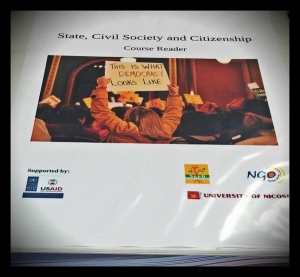
Quiet and revolutionary actions are taking place in the Buffer Zone and online every day. One of these is the State, Civil Society and Citizenship course, offered in the Buffer Zone and soon to be offered online by David and his team. This week, we talk to David to find out more about their initiative.
Hi David! Can you tell us a little bit about yourself?
I was born in England and spent my working life in three main locations – London, Northern Ireland and Cyprus. I have worked as an academic, researcher, community worker and NGO activist.
You must have some very interesting insights that have led you to your current position in Cyprus.
Perhaps the most important and formative experience for me was leaving school at 17 and leaving England to work for a community education project in Belfast, Northern Ireland. This was during a particularly violent phase of the “Troubles” as the conflict there was euphemistically called. I gained the kind of education there you couldn’t get in a college or university.
That time gave me a very human insight into the factors which can drive some people to take up arms and prosecute a war against others, but also how even in the midst of conflict, life goes on. People continue to try and live as peaceful a life as possible. In many ways these early experiences set me on a course to try and understand the nature of inter-ethnic or inter-national conflict and how the neccessary difference between individuals and groups might be managed without lethal outcomes.
 You are part of the team behind offering a Civic Participation Course for NGO activists. How did the idea come about?
You are part of the team behind offering a Civic Participation Course for NGO activists. How did the idea come about?
The initiative for this course arose out of a partnership established by three very different organisations responding to a call for proposals made by UNDP in Cyprus during the summer of 2014. The NGO Support Centre is based in Nicosia and largely serves the Greek Cypriot community. SeeD is a bi-communal organisation that is mainly concerned with attempts to overcome the deep-seated divisions evident on the island whilst the University of Nicosia is an academic institution, based south of the partition line but working with an increasingly international student cohort.
 What are you trying to accomplish with this project?
What are you trying to accomplish with this project?
We know from our experience in Cyprus that there is a need to encourage a more creative engagement with factors which shape our daily lives. Decision-making on this island tends to reside with an elite, largely organised around established political parties. Our interest is to promote both the skills and knowledge for a much wider circle of people to make a difference within their own communities, set their own objectives and realise outcomes which may be neglected by those in positions of power.
Let’s remember also that the conflict on the island has become locked into a stalemate for at least 40 years. We need to be looking at people outside the established power structures who may have innovative ways of addressing this stalemate and moving the situation forward. This is what we wish to encourage.
What do you like most about the Civic Participation Course?
What is innovative about this project is how we have combined the academic credibility of university modules with a careful attention to the needs of NGOs and community activists. We wanted to try and stimulate a dialogue between those who have considerable academic knowledge related to the role of civil society and the state with course participants who bring with them real practical knowledge about how these issues shape everyday lives. And it’s working!

What is your proudest accomplishment with the Course?
Well, we are still at an early stage. But I am really pleased that we have already delivered an initial face-to-face course in the center of the Buffer Zone. We have had a mixed cohort of Turkish Cypriot and Greek Cypriot teachers and students. I think it’s been a quiet and undemonstrative act of real cooperation between all who were involved.
How can interested people get engage with the Course?
We will actually be offering an online version of the course soon! It will be University accredited. We would encourage anyone interested in the course or the project more generally to get in touch with us through our Facebook and Twitter. Please don’t hesitate to connect with us.
Editor’s Note: You can click here to see photos from the course.


Reblogged this on mtiritas.
LikeLike